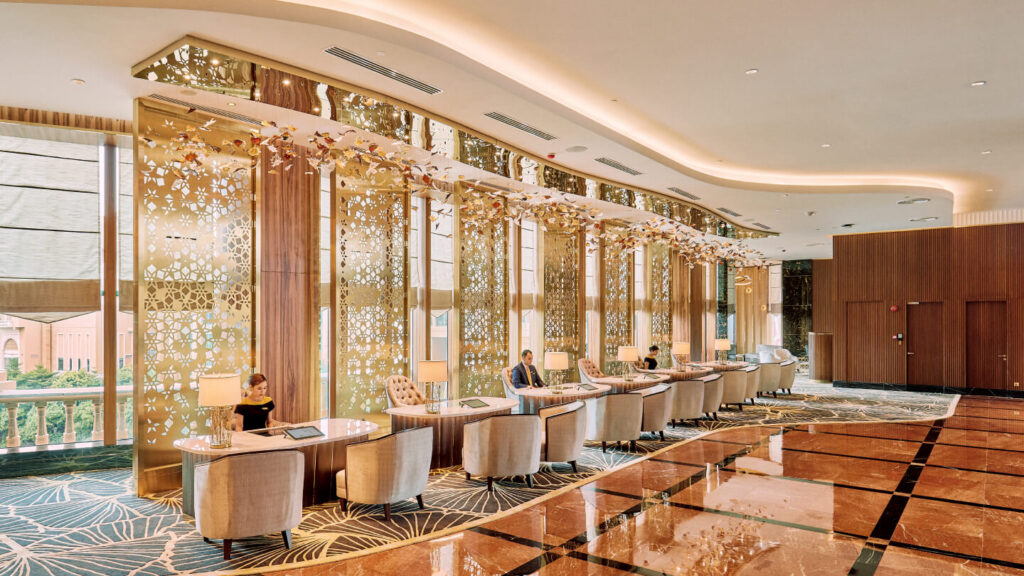This post is sponsored by Shiji Group
Sunway Hotels & Resorts is one of Southeast Asia’s leading hospitality groups, with 12 hotels located across Malaysia, Cambodia, and Vietnam and close to 4,000 guestrooms, suites, and villas in total. The brand is owned by Malaysian conglomerate Sunway Group, which grew from its origins as a tin mining and quarrying company in the 1970s into the conglomerate it is today with 12 business subsidiaries including hospitality.
The Sunway Group believes that in our increasingly digital age, time is fast becoming a commodity, and because of that, strives to ensure its guests can make the most of their time with them. It has been this focus that has driven Sunway to adopt technology to support this mission.

The journey to hospitality technology leadership
Sunway’s Group Director of IT, Ong Kok Hui, calls himself a “curious cat” who worked in a variety of industries such as security, broadcasting, book distribution, and transportation before starting his career in hospitality.
He found some of these industries less than engaging, with the traditional mix of vendors, suppliers, and systems integrators. He began to be curious about how hotels could use technology and decided to take a role at Sunway Hotels.
Today, he loves this business because of the wide range of projects he’s exposed to. “This is the one industry where you see it all and you get to balance work and play.”
Why working in hospitality technology is different
The people skills required in hospitality technology stood out to Ong in comparison with other industries.
“In traditional technology roles, unless you work in sales, you do not interact with many other people. In hospitality technology, you get to interact with a wide range of departments and people from different backgrounds. That’s kept me going for the past 18 years.”
This collaboration across departments revealed an opportunity to simplify and automate processes for daily operations.

Digitizing operations at Sunway Hotels
Ong provided an example of managing forms and approvals as an early example of the digitization journey Sunway Hotels embarked on nearly 18 years ago.
“Something as simple as requesting a shift change used to require multiple paper forms and going from department to department to get signatures for approval.”
He knew digitizing processes like these would result in a better experience for everyone. Since hotels operate 24 hours a day, requiring signatures in person from people on eight-hour shifts wasn’t practical.
“Working together with our team of developers we were able to create a solution, customize it for use in our hotel, and roll it out to our various departments. It didn’t require in-person interaction and could run 24 hours a day. After rolling that out, we became far more efficient. Paper didn’t go missing, and we had an official record of everything. That was 18 years ago but was our first major step forward in our journey towards digitization and automation.”
Fast forward to today, and this mentality of digitizing processes has remained. But a new challenge came up recently: this time around their point-of-sale (POS) solution.
Using transition as an opportunity
Sunway Hotels had been using the MICROS-Fidelio POS, but with that platform scheduled to sunset to make way for a new product from the company, Ong and his team decided to use the transition as an opportunity to evaluate all of their options.
“While our previous product had some helpful features, it had limits in its capability. The provider said they would introduce us to other companies for point solutions but didn’t want to offer all functionality themselves,” Ong shared. “But we wanted a single partner who offered everything on one platform and could be a single point of contact for us.”
In Ong’s experience, an all-in-one platform was important for solving any problems that could come up. “Unless a partner builds the technology and owns it and can make changes as needed, it becomes challenging to manage as a customer. Managing multiple technology providers creates more potential points of failure. By having everything on one platform, you eliminate the possibility of bickering between companies and finger-pointing for who was at fault if something goes wrong.”

Designing the technology selection process for success
To ensure Sunway could evaluate new technology options effectively, Ong formed a committee of representatives from every department that needed to use the POS platform or access data from it. This included multiple teams from Food & Beverage, Operations, and Finance. “We needed an end-to-end solution that provided support for each of them.”
This was especially important because of the complexity of supporting F&B operations. Every order placed needs to be managed by a chain of people: from the service staff to the kitchen to delivery, with operations management and finance needing to track the results.
“Traditionally IT would say ‘this is what we’re using,’ and that was that,” Ong recalled. “But we learned it’s best to actively seek input from a wide range of teams to create the best solution together. We’ve changed the landscape of IT. We are no longer just an implementor. We act as a business partner to all other departments, so we need to be more open and more receptive, and more people-friendly to achieve this. We seek to engage all stakeholders – anyone who uses the data or will interact with our systems – instead of dictating what we’ll use and what we’ll do.”
Gathering input and buy-in from each stakeholder
Through taking the time to get to know each person on the evaluation committee, he developed an understanding of their needs and earned their support and contribution to the initiative. “Because we had their buy-in, the process became much easier for us.”
Ong and his committee used existing communication channels to build awareness for the upcoming change. “In most hotels, we have a morning briefing with all department heads. When the topic of technology came up, the General Manager would highlight everything we needed to do. With all the people in the room, we talked about the opportunity and need – and how we needed their help.”
This process helped build support from the front lines. “I found people would talk about it casually over lunches and I could sense the excitement that a new system was coming.” As buzz was building, Ong started to get unsolicited feedback on requirements and wishlist items from across the company, ranging from usability to connectivity with other systems.
All in all, this approach to change management drove interest and momentum around technology change at Sunway Hotels. “This process we used of getting buy-in from the top down and bottom up made it much easier for us to move and innovate with this project.”
The evaluation and selection process
With buy-in to the process attained across their teams, Ong and his team began reviewing various options for a POS and conducted a more detailed analysis of the providers on their shortlist.
Of all the companies that presented their solutions to the Sunway team, Shiji Group showed itself to be the most holistic technology partner. “We were just looking to replace our point of sale system, but instead of portraying themselves just as another point of sales vendor, they showed us who they really are – a unified platform for a wide variety of solutions. That changed my perception of Shiji as a company. They had a lot of things in their ecosystem that our hotels could benefit from if we worked with them.”
The fact that Shiji Group offers a wide variety of solutions to hotel companies of all sizes was also attractive to Ong because it meant they could gather best practices from their clients around the world and deploy them with their customer partners.
Finally, Shiji’s presence in the region was a key factor in their decision. “Shiji is a lot stronger than others in our area, and the local support and expertise they offered was compelling for our team. They gave us confidence they had the ability to handle anything that came up.”
Impressed by Shiji’s Infrasys product, its broader product ecosystem, and the support provided, Sunway Hotels decided to move ahead with Shiji for its POS solution.
What caused a successful implementation
Research has shown more than 80% of all hoteliers have experienced some type of failed technology implementation, so Ong wanted to benefit from Shiji’s expertise during the onboarding process to maximize the benefits of their partnership.
“We have all hands on deck for you,” Ong recalls Shiji telling him as they came on-site to help with implementation – which impressed him and his team.
While Sunway’s PMS had some issues to work through, the Shiji team showed Ong they had the people and knowledge, and resources to tackle anything that came up. “Even if they needed to bring in expertise from their global team, they did. They showed determination to do the job right, and I was impressed by their hard work and focus on delivering results.”
For Ong, it’s not only a company’s technology that makes the difference but the people who work at that company. “Shiji’s team would frequently share new ideas and strategies with us, and that made us feel this relationship wasn’t just a one-time installation and they would move on. They kept finding new ways to support our business. They keep making an effort to show our teams they are there for us at all times.”
Through this partnership and “all hands on deck” mentality, Shiji’s Infrasys was implemented successfully to the satisfaction of all stakeholders.
Results today, and innovation for tomorrow
Today, the usability of the POS is no longer an issue. “We have fewer complaints than we ever used to have,” Ong observed.
But even more importantly, the relationship has helped Sunway Hotels stay innovative and deploy new things because of Shiji’s approach of acting as a strategic technology partner.
“If there is anything that is not relevant to Shiji itself but is a new idea we’d like to try, we can always count on them to procure it for us or to help us implement it.” This mentality combined with Shiji’s technology platform and API connectivity empowers the Sunway team.
“Shiji creates a lot of opportunities for us, both now and in the future. They are always innovating, and I’m never surprised when I see them continuing to release new products and solutions that create new opportunities for us. There is so much we can do with them. Our partnership allows us to be more competitive today and better prepared for the future.”
About Shiji Group
Shiji Group is a multinational technology company that provides software solutions and services for enterprise companies in the hospitality, food service, retail, and entertainment industries, ranging from hospitality technology platform, hotel management solutions, food and beverage, and retail systems, payment gateways, data management, online distribution and more. Founded in 1998 as a network solutions provider for hotels, Shiji Group today comprises over 5,000 employees in 80+ subsidiaries and brands in over 23 countries, serving more than 91,000 hotels, 200,000 restaurants, and 600,000 retail outlets. Learn more here.









